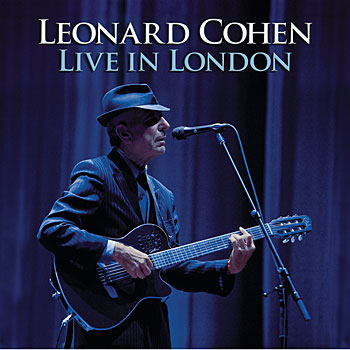“It’s funny. Johnny Marr has a place there, and we are kind of friends. I walked into this ice cream shop, and the guy goes, ‘Jesus, what a weird day.’ He goes, ‘Johnny Marr walked in here like 20 minutes ago, and now you. Is this like indie guitar 80s day or something?’” While cutting a few demos in the Portland area, R.E.M.’s Peter Buck discusses the band’s songwriting process, and his aspirations for the next record. “There are some really pretty acoustic things, some really total noisy rock, and some kind of poppy stuff. It runs the gamut. Ideally, if it were me making all the decisions, I’d say the record would be a lot broader than the last one. But still, I want to do it really quickly and immediately and not do a huge amount of overdubs.“
Category: Music
Trickster on the Borderlands.
“Ask Muhammad All why he fights one more fight. Go ask Marlon Brando why he makes one more movie. Ask Mick Jagger why he goes on the road. See what kind of answers you come up with. Is it so surprising I’m on the road? What else would I be doing in this life — meditating on the mountain? Whatever someone finds fulfilling, whatever his or her purpose is — that’s all it is.” As a companion to Douglas Brinkley’s recent cover story on “Bob Dylan’s America”, Rolling Stone publishes excerpts from their various interviews with Dylan over the years. (I haven’t read the Brinkley article — it’s not online — but that “United States of Bob” conceit is one Greil Marcus already pretty thoroughly explored in The Old, Weird America (nee Invisible Republic) — listen to “Bob Dylan’s 115th Dream” for a good intro on the subject, or consider how much antebellum history Dylan was able to squeeze into three verses in “As I Went Out One Morning.”)
In other Bob news, and in keeping with the trickster on the borderlands” persona Dylan adopts for much of the zydeco-flavored Together Through Life, there’s a thin line between love and hate in the surprisingly violent new video for “Beyond Here Lies Nothin’,” exclusively over on IFC. “Subterranean Homesick Blues,” it isn’t. At best, you can consider it in keeping with a traditional murder-ballad-type ditty like “Delia’s Gone,” I guess. But those who believe Dylan has serious problems with women are going to find plenty of ammunition here. (And that’s before they even get to “My Wife’s Home Town.”)
Dressed in Black Again.
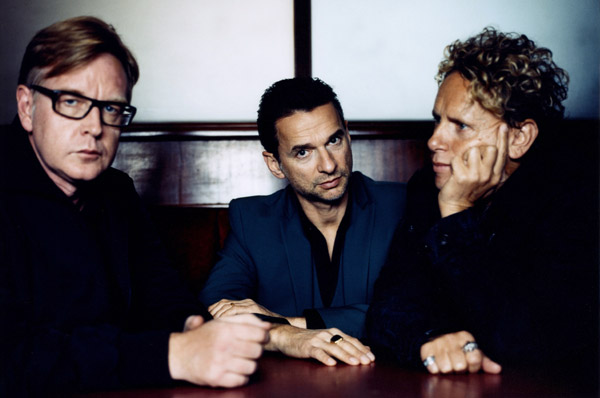
To get the bad news out of the way first, the obscenely catchy first single, “Wrong,” is far and away the high point of the album. I warmed slow to this ditty at first, but, even tho’ it unfolds at a more relaxed tempo than I might prefer, it’s undeniably infectious. With Dave Gahan in full street-preacher mode and Marty Gore carrying the song home in the final stanzas, “Wrong,” like “Precious” on Playing the Angel and “It’s No Good” on Ultra, can stand proudly with the best singles of the halcyon days, and that’s no small thing.
That being said, there are a lot of filler tracks on Sounds of the Universe, and it’s a hard album to recommend to anyone but tried-and-true DM fans (who don’t need the recommendation anyway — they all bought multiple versions of it, likely along with tour tix and a DM t-shirt, last Tuesday.) Along with producer Ben Hillier, who’s good with the bells and whistles, I guess, but never really manages to make the DM sound “fill the room” as it did in the Daniel Miller/Flood days — SotU is often far too tinny), the band seem to be exploring ways to resurrect and update their old synth-sound without over-forcing the issue. The results are mixed.
(Digression: For a good example of “over-forcing the issue,” imho, listen to U2’s recent No Line on the Horizon, which to me sounds like a bunch of quintessential-to-the-point-of-feeling-contrived U2 hooks interpersed amid long sessions of random studio noodling. No songs really coalesce therein — it sounds like someone fiddling with the dial on a radio that only plays U2. And No Line is all glommed together with that uber-Lanois production sound. I like Daniel Lanois, he’s done some landmark albums — Achtung Baby, Us, Time Out of Mind — and I’ve even bought some of his solo stuff over the years. (“Sleeping in the Devil’s Bed” is a mixtape standby.) But it all does kinda sound the same after awhile.)
The question arises on SotU: What is DM’s old sound? “Fragile Tension,” like “Lillian” on the previous album, goes whole-hog with the early-synth pulse, recalling the very early days of the band — Speak & Spell, A Broken Frame, etc. Alas, it doesn’t really work. (As a vocalist, Gahan does some things really well — melisma isn’t one of them.) “Spacewalker” is another atmospheric instrumental a la “The Great Outdoors!”, “St. Jarna,” or “Agent Orange,” the type of moody keyboard piece that conjures up visions of Eurothrillers like George Sluizer’s The Vanishing (or, more on topic, Anton Corbijn’s Strange.) “In Chains,” on the other hand, is more in the later-period gospel-grunge mode of “Clean,” “Higher Love,” or “Condemnation” (with a touch of the bang-the-metal interlude of “Stripped”) — it’s perfectly acceptable, I guess, but it doesn’t really bring much new to the table.
Those tracks aside, main songwriter Martin Gore spends too many songs in the treacly New Age, post-rehab platitude rut that characterizes at least a few tracks on every album since 1993’s Songs of Faith and Devotion. (See “Freestate” or “I am You,” for example.) The middle of SotU in particular — “Fragile Tension,” “Little Soul,” “In Sympathy,” the Beatlesque by way of Tears for Fears second single “Peace” — all run together in this fashion.
Speaking of sounding-like-TfF, my second favorite song on the album is probably “Perfect,” which argues amusingly that even when you consider the Anathem-like philosophical ramifications of string theory, the DM multiverse is still on the bleak side. (“In a parallel universe that’s happening right now, things between us must be worse, but it’s hard to see just how.“) That being said, with its mid-80’s key changes and all, “Perfect” sounds eerily like a long-lost Howard Jones number.
In its favor, SotU is the first DM album where the Gahan-penned contributions intermix with the Gore fare enough to be virtually indistinguishable. Indeed, while two of the Gahan songs — “Come Back” and “Miles Away/The Truth Is” — are a little over-produced (The stripped down version of “Come Back” which leaked a few months ago attests to this), it’s the lead singer, rather than Gore, who seems to have a better handle on “that classic DM sound.” In effect, while Gore sometimes seems a bit lost in his gospel influences lately, Gahan — as one review I read somewhere well put it — has improved to the point of becoming a pretty good Depeche Mode tribute band.
Now even I, a DM fan of long standing, am prone to bag on how much of the classic Mode oeuvre revolves around sex, sin, obsession, religion, and redemption. (My love is a black car, and you crucify me on the steering wheel because I asked you to, etc. etc.) Still, the best moments on Sounds of the Universe are when they stop reaching for some new synthetic harmony and, as with “Wrong”, just let that old freak flag fly. Put another way, it’s when DM stops trying to fuse their early synth and later gospel periods into a new, cohesive sound and goes right for the crunchy, tongue-in-cheek “Master and Servant”-to-“Personal Jesus”-style crowd-stompers that the album really works best.
Gahan’s “Hole to Feed,” for example, is a jaunty ditty about what one might call the Benjamin Braddock problem — once you’ve finally managed to land the one true love you’ve been writhing and pining for…well, then what? (“We are here, we can love, we share something. I’m sure that you mean the world to me. When you get what you need, there’s no way of knowing what you have is another hole to feed.“) As for “hole to feed,” I’ll let you figure that one out. But, like any number of vaguely raunchy DM songs (or like Gary Oldman endlessly stuffing the hole in his backyard with cash in Romeo is Bleeding), the metaphor here isn’t very oblique.
Similarly, with its creepy-filthy blips and trademark Gahan croon, “Corrupt,” the album closer, is another electroblues number that’s right in DM’s usual wheelhouse (“I could corrupt you, it would be easy. Watching you suffer, Girl, it would please me.“) And it suggests the sexy, mordant fun the band could be having if they stop trying to grope toward some new respectable Zen plateau and just unabashedly do what they do best.
Along those lines, I’d argue that some of the best songs of the SotU sessions were inexplicably left off the album (but are included in the deluxe version, which also offers 14 very worthwhile demos of earlier songs such as “Walking in My Shoes” and “Little 15”. Think DM standards done with Magnetic Fields simplicity.) That may be because they just feel looser and less forced than many of the album cuts. A sinister electronic sibling to Kristin Hersh’s indie rock standard “Your Ghost,” DM’s “Ghost” is driven by the most infectious and mesmerizing synth backbeat of the new tracks. (“I’m the ghost in your house, calling your name. My memory lingers, you’ll never be the same. I’m the hole in your heart, I’m the stain in your bed, the phantom in your fingers, the voices in your head.“)
“The Sun and the Moon and the Star” is the type of throwback torch song that Martin Gore probably writes over breakfast every morning, but it’s still more resonant than “Jezebel,” the one that’s officially on the album. (And, tbh, neither will replace classics like “Somebody” or “The Things You Said” in the hearts of Gore aficionados.) And “Oh Well,” the first song co-written by Gore and Gahan, succeeds because it’s nothing more or less than what it aspires to be — a propulsive club cut designed just to get ’em dancing. I’ll let that song sum up my general impression of SotU, which is a mostly harmless outing, and works best when it doesn’t try so hard: “It’s nothing to feel ashamed about, nothing I can complain about. Oh well.“

Songs of Love and Hate.

Rumors of the Death of a Ladies’ Man have been greatly exaggerated: From the bookmarks, and based on the current tour that’s recently been immortalized on the very listenable Live in London, Salon‘s Gary Kamiya sings the praises of one of his idols, Leonard Cohen. “‘Looks like freedom but it feels like death/ It’s something in between, I guess,’ Cohen sings in ‘Closing Time.’ That knife edge, that balancing act between the intolerable and the redemptive, is where Cohen lives, both in his work and in his performances. He is a fearless explorer of darknesses of all kinds, mostly erotic and romantic, but also, and increasingly, political and spiritual. For Cohen, without darkness there is no light — a credo summed up in his song ‘Anthem,’ with its exquisite chorus ‘Ring the bells that still can ring/ Forget your perfect offering/ There is a crack in everything/ That’s how the light gets in.’“
Let’s Stick Together.
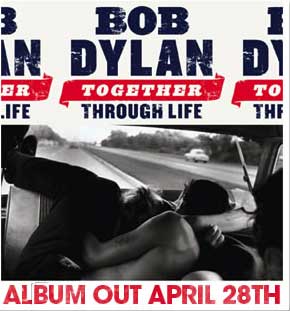 “There didn’t seem to be any general consensus among my listeners. Some people preferred my first period songs. Some, the second. Some, the Christian period. Some, the post Colombian. Some, the Pre-Raphaelite. Some people prefer my songs from the nineties. I see that my audience now doesn’t particular care what period the songs are from. They feel style and substance in a more visceral way and let it go at that. Images don’t hang anybody up. Like if there’s an astrologer with a criminal record in one of my songs it’s not going to make anybody wonder if the human race is doomed. Images are taken at face value and it kind of freed me up.” On the official site, Bob Dylan talks about his new album, Together Through Life, due out April 28.
“There didn’t seem to be any general consensus among my listeners. Some people preferred my first period songs. Some, the second. Some, the Christian period. Some, the post Colombian. Some, the Pre-Raphaelite. Some people prefer my songs from the nineties. I see that my audience now doesn’t particular care what period the songs are from. They feel style and substance in a more visceral way and let it go at that. Images don’t hang anybody up. Like if there’s an astrologer with a criminal record in one of my songs it’s not going to make anybody wonder if the human race is doomed. Images are taken at face value and it kind of freed me up.” On the official site, Bob Dylan talks about his new album, Together Through Life, due out April 28.
The Gods Must Be Crazy.
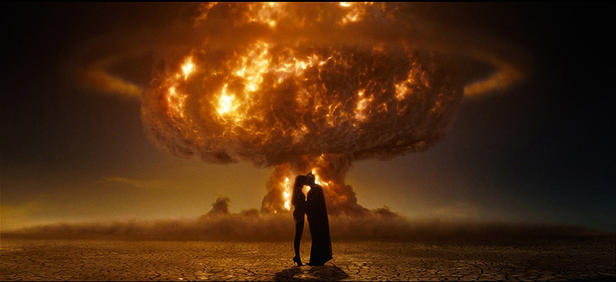
“Come writers and critics who prophesize with your pen, and keep your eyes wide — the chance won’t come again.” As in the original comic, two Dylan songs bookend Zack Snyder’s ambitious, admirable, and flawed adaptation of Alan Moore and Dave Gibbons’ Watchmen, the critically-acclaimed tale of the rise and fall of Cold War superheroes (which I’ve now seen twice.) The first, “The Times They Are A-Changin’,” comes direct from Dylan himself, and scores the impressive, easter egg-filled opening credit montage that is one of the highlights of the film. Here, Snyder has taken the world of Watchmen, fused it with some quality Bob, and made something transporting and uniquely filmic. (Fanboys and fangirls, note the original Nite Owl saving the Waynes. By the way, Dylan, US History, and superheroes — yes, this sequence is easy for me to love.)
On the other hand, over the end credits, we get a a truly terrible version of “Desolation Row” by My Chemical Romance, whom I’m not particularly familar with but who, on the basis of this cover, would seem to be derivative, talentless hacks. Now, I’m not averse to Dylan played fast and loud. To hear it done right, check out Rage Against the Machine excavating the angry heart of “Maggie’s Farm”, or the White Stripes’ live takes on “Isis” or “Lovesick”, or, of course, Jimi’s “All Along the Watchtower” (also in the movie, right where it is in the book.) But MCR have completely missed both the power and the poetry of “Desolation Row,” and just play it fast, sloppy, and nu-punk like the faux-Green Day cover band (which makes them faux-faux-Pistols) they seem to be.
If I’ve spent a lot of time here talking about these two Dylan songs at the onset instead of Watchmen, it’s because they mirror the dichotomy present in the film. In certain sequences like the opening credits, Snyder manages to catch lightning in a bottle and really bring elements of the graphic novel to life, albeit in truncated form. There are moments in the movie, usually involving Rorschach or Dr. Manhattan, where I was struck by the sheer sensation of seeing the book leap off the page. (Short plot summary for the uninitiated: In an alternate-America 1985, on the eve of what appears to be nuclear Armageddon, one of a dwindling band of ex-superheroes is murdered in (and then out of) his New York City apartment. Rorschach, a borderline-psychotic right-wing vigilante who dresses like Philip Marlowe and rasps like Christian Bale, wants to know why. It’s a dangerous question.) The altered ending notwithstanding, it’s somewhat amazing to me that we got a Watchmen movie this close to the source material, and, by all accounts, Snyder had to fight tooth and nail with the studio suits for every cynical, resolutely uncommercial facet of it.
But, at other times, Snyder’s bad habits sadly leak through and undeniably taint the end product, most notably in the gratuitous violence present here. In interviews, Snyder can sometimes come off as a geekier version of the white fratboys in Harold and Kumar. (“Dude, that’s so extreme!“) And that better-harder-faster mentality results in some serious whiffs along the way in Watchmen, when Snyder ratchets up the gore and bone-breaking at the expense of the story. However close the movie gets to gorgeously capturing Manhattan’s reveries on Mars (although I wish the Doc’s living in an endless now was better emphasized.), it basically drops the ball completely on Rorschach’s “origin” (which I quoted in my pre-movie post), mainly because Snyder sidesteps the existential horror of Kovacs’ story to amp up the violence of it. In the comic, Kovacs has pierced the veil of the sheltering sky and discovered all is blackness. In the movie, he just seems to be on a torture-porn killing spree. Same goes for a scene involving Dan (Nite-Owl) and Laurie (Silk Spectre) getting jumped by the Top Knots gang in a dark alley. It’s bone-crushingly brutal when it doesn’t need to be, actually has these two kiling people Rorschach-style, and seriously detracts from the more interesting scene it’s intercut with, that of Dr. Manhattan inadvertently exposing his disinterest in humanity in an interview with Ted Koppel.
Now, as with loud, angry Dylan covers, I’m not averse to gore or over-the-top violence when it serves the narrative. To take an example, there’s a scene involving human entrails stuck to the ceiling (don’t you want to see this now?) which is also overly Snyderish, but I think works in context. (The voiceover is making Hollis Mason’s point that, with the arrival of Dr. Manhattan (i.e. the advent of atomic weaponry), the superhero game has forever changed — it’s no longer gallantly nabbing bankrobbers and pursesnatchers with a few “Wham! Pow!” four-color blows, but something much darker and more lethal.) But Snyder’s Watchmen is unnecessarily violent at the wrong times (see also Big Figure’s henchmen), and then inexplicably goes soft at the moments when gore is virtually required. I’m referring here to the consequences of the Big Plan, which feel strangely weightless in the movie, partly because (in this cut) no characters we’ve been following are anywhere close to Ground Zero and partly because, unlike every other action sequence in the movie, it’s all very PG-13 all of a sudden. (Contrast this with the opening of Chapter 12 in the comic, which is basically several pages of horrific imagery, unlike anything we’ve yet seen in the story.) Now, I’m willing to bet dollars-to-donuts that 9/11-squeamish studio types were unyielding about the soft-pedaling of the climax here (which, by the way, is elegant in its own way even without the squid.) Still, it’s hard to escape the feeling that, while Moore and Gibbons used violence in their tale to comment on its awfulness (and the awfulness of The Plan), Snyder often just uses it because it’s like, totally extreme.
Don’t get me wrong: I have no idea how it plays to people unfamiliar with the comic, but for the rest of us, there’s a lot to like here. Even notwithstanding some godawful, cringe-inducing age and Nixon make-up (I guess everyone was busy on Benjamin Button) and one of the worst movie sex scenes in recent memory (I’m offended on behalf of Leonard Cohen), Watchmen is a better film than some of the critical pans make it out to be. Jackie Earle Haley’s Rorschach is especially dead-on, and is rightfully drawing most of the acting kudos right now — This should be a career-defining role for him. But Billy Crudup’s Dr. Manhattan and, surprisingly, Patrick Wilson’s Nite-Owl are also pretty close to note-perfect. (So too is Matt Frewer’s Moloch, who absolutely nails his big moment — “You know that kind of cancer that you get better from eventually? Well, that ain’t the kind of cancer I got.”) And Jeffrey Dean Morgan’s Comedian and Matthew Goode’s Ozymandias grow on you, even if Ozy seems a bit charisma-starved compared to his comic counterpart. (As for Malin Ackerman’s Silk Spectre…uh, well, let’s just say she’s in it too.)
So, in short, I liked the movie, would recommend it to readers and non-readers alike, and thought even more of it the second time around when I was less burdened by expectations. (Yes, it’s wayyyy better than 300, and I’m looking forward to the 30-minute longer cut, which is rumored to spend more time with Rorschach’s shrink and the two Bernards.) Still, it’s hard to shake the nagging sense that the things I really liked about Watchmen would’ve made it into any reasonably faithful movie version, and that a different director than Snyder might’ve brought about a better, richer film in the end.
Still, as my old boss was wont to say: We don’t need people who get the ball to the twenty-yard line; we need people who can bring it over the goal line. And, for better or worse, Snyder got this ball over the goal line where Terry Gilliam, Darren Aronofsky, and Paul Greengrass couldn’t. Let’s give credit where it’s due: After twenty years of trying, they actually made a Watchmen movie, and it ended up being surprisingly close to the source material and not at all an embarrassment or cash grab. I presume the Rorschach types probably loathe this end result, compromised as it is in certain places. But for the rest of us, I’d say this new Utopia, however flawed at times, is close enough for government work.
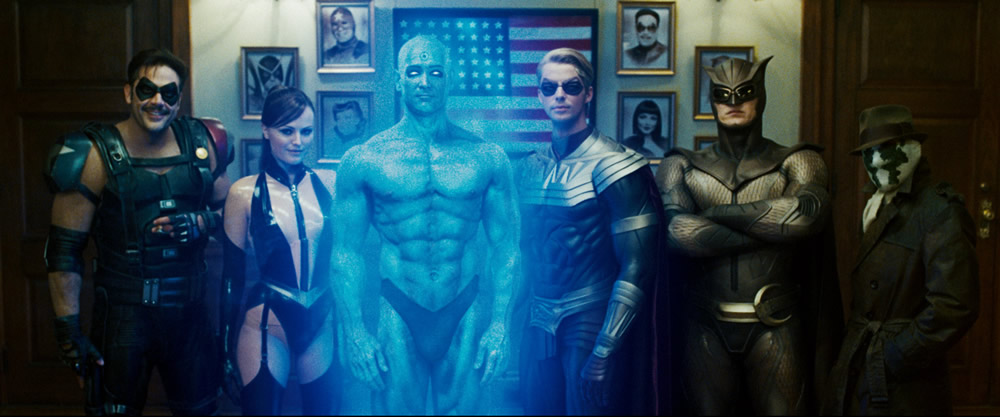
We’re going the wrong way!!
(For optimal results, read the post title in Starbuck v. Hammer screech-mode.) With the new album right around the corner, Depeche Mode release the video for their new single, “Wrong.” Hmm. Definitely not as catchy or as DM-definitive as “Precious” off the last album, but I could see this growing on me. That minimalist electroclash jeep-rock beat reminds me of the “In Your Room” remixes back in the day, and there’s something about that chanted tinny-industrial refrain — Wrong! — that wouldn’t seem out of place on Music for the Masses or Some Great Reward. In any case, it’s good to hear the band isn’t flinching from the synths anymore.
Fast Train Coming.
Don’t get up, gentlemen — he’s only passing through: Rolling Stone gets word of a “surprise” Bob Dylan album coming out next month(!) “The magazine quotes an anonymous insider who says the 10-song set’s arrival ‘came as a surprise’ to those around the folk-rock legend. The currently untitled album reportedly centers on ‘raw-country love songs, sly wordplay and the wounded state of the nation.’“
Love Songs ’09.
Happy belated valentine’s day, all. I know this is a few days late now, but just to keep the streak going (’05, ’06, ’07, ’08), here’s the usual yearly song-blog entry. And with that, the obligatory V-day, behind-the-curtain status-update: Well, as per the norm, I’m as single as a one-dollar-bill. (The last time I had an actual, honest-to-goodness valentine on this day, l’il Berk notwithstanding, was in 2004. Before that, 2000.) At any rate, it’s now been years since the last gal, figuring she could do better, left with a shrug and disappeared forever…just like the one before and the one before that. And, since then and right up to now, there’s been no one in sight.
This obviously can get to be a little depressing, and, now that I’ve reached my mid-thirties by myself, I sometimes struggle with bitterness over it. Didn’t virtually every movie, tv show, song, and book I’ve ever consumed consistently promise I’d have someone in my corner? It’s not like I’ve been a bad guy. (Then again, all the evidence tends to suggest that that might well have been part of the problem. Like the old Stephen Wright joke, women have often told me I’m “wonderful” …usually right as they kick my sorry ass to the curb.)
But, oh well. I’ve got my health, my faculties, and a First World quality-of-life, so I’m already way ahead in the game compared to a lot of folks out there. And to be honest, I’ve got enough problems on my plate right now without getting pulverized yet again by someone else’s caprice anyway. Besides, given my current steady-jobless, apartment-less, penniless, PhD-less existence, which, frankly, seems less and less “transitional” as the months go by, I probably wouldn’t date me either. (As a colleague noted, nostalgically studying the depression era is turning out to be quite a bit more preferable than actually living it.)
So, no worries. Some politically-minded freelance writing gigs should get me through the next couple of months even if no steady employ is forthcoming, and one day soon, I’m sure, I’ll rise like a phoenix from the ashes of my current lowly existence. And, lo, it’ll be a New Day…just like on The Wire. At any rate, to the music:
Told you I’ll be here forever
Said I’ll always be your friend
Took an oath, I’mma stick it out ’till the end
Now that it’s raining more than ever
Know that we still have each other
You can stand under my umbrella…
As with ABBA last year and Kraftwerk in ’06, I like to kick this post off with a happy, guilty pleasure. This year, it’s Rihanna’s “Umbrella”. Yes, it got played into the ground during its single run, even getting its own Clinton v. Obama version on Mad TV last year. But, just as with Titanic, sometimes things are popular for a reason. With its Jay-Z opening, infectious hook, not-very-oblique double entendre, and inescapable chorus, “Umbrella” is pure, unadulterated pop, and a perfect lyrical counterpart to another quality hip-hop ballad, Method Man’s “All I Need”. (“Even when the skies were gray, you’d rub me on my back and say ‘baby, it’ll be ok.’ Now that’s real to a brotha like me baby…”) And now, with a lot of things “comin’ down with the Dow Jones” in this current economy, “Umbrella” is starting to sound more and more like one of the quintessential 21st-century Depression-era ballads, the kind you might find on “Sister, Can You Spare a Dime?”-type mixes fifty years hence.
[Note: I thought about writing up “Umbrella” this year before the unfortunate Chris Brown situation last week, which can’t help but inflect the song negatively. At first, I figured it might be in poor taste now and that I should choose some other pop song. But, in the end, I just decided to go with it anyway — hopefully, the song stands on its own, and will continue to long after recent events have receded.]
“Yes indeed, I’m alone again.
And here comes emptiness crashing in.
It’s either love or hate, I can’t find in between,
’cause I’ve been with witches and I’ve been with the queen.
It wouldn’t have worked out anyway.
So now it’s just another lonely day…”
On the other side of the emotional spectrum from “Umbrella”, Ben Harper’s “Another Lonely Day” is an acoustic, bone-dry lament to the most recent smash-up. (“Yesterday seems like a life ago, ’cause the one I love today, I hardly know.“) To be honest, there are elements of this otherwise-beautiful break-up song that rankle. Unlike, say, Chris Isaak (listen to anything on Forever Blue) or Tom Waits (last year‘s “Make it Rain” for example), this reads like an I-got-dumped song by a guy who’s never, ever been dumped. (“I’d rather walk alone than chase you around.” Oh, it’s your call, then? How nice that you have the hand. “Further along, we just may?” Again, not up to you, pal.) If, as the song says, this final kiss-off is of Harper’s doing, I wish it’d had more of the conflicted brio of U2’s “So Cruel” or most any of Dylan’s impressive stable of “It’s been real, it’s been fun, hasn’t been real fun” farewells. But, not to lose the forest for the trees, “Another Lonely Day” is still close to perfect in its simple, painful delicacy, and it definitely well captures that grim “Solitary Man” sensation of “Ugh. Here we are again.”
*********
Feeling like I needed you,
Like I’m walking up surrounded by me,
A&E.“
Ever looked at the words of a song you thought you knew decently well and discovered that it’s not at all about what you thought it was? (I would guess a lot of Republicans had this experience when discovering that “Born in the USA” wasn’t even close to a pro-Reagan anthem of the heartland.) This happened to me just this past week when I decided to write up Goldfrapp’s A&E. Given the upbeat tempo, the video, and the snippets of lyrics I knew, I always thought this song was about someone slowly emerging out of the clouds of a bad break-up and enjoying a day outdoors. (“It’s a blue, bright blue Saturday, and the pain’s starting to slip away.“) But, I was wrong. Reading more closely, it seems the “backless dress” is a hospital gown, A&E is the British term for the ER, and Alison Goldfrapp is basically waking up druggy after a botched “Then he’ll be sorry!” suicide attempt. (“I think I want you still, but it may be pills at work.“) Uh, oops.
Ok, so this is less like Bjork’s All is Full of Love” and more like The Sundays’ “Here’s where the Story Ends” than I originally thought. Still, it’s a great song, and not half as depressing as it reads on the page. Goldfrapp more often go for cinematic Portishead-like atmosphere (Felt Mountain) or sultry, come-hither dance numbers (“Ooh, La La,” “Strict Machine”), and I’m a big fan of both settings. Still, the organic, pastoral feel of Seventh Tree is a grower, as is “A&E.”
*********
All the people that I love can’t hear.
All the people I love are drunk.
All the people that I love aren’t here.”
After getting “A&E” wrong, I’m not even going to try to make heads or tails of the lyrics to Hot Chip’s obscenely catchy “Crap Kraft Dinner”, a current staple of my driving time. At first it just seems to be about a happy, drunken party buzz (i.e. the exact opposite of “This Place is a Prison,” by The Postal Service.) But, eventually amid the haze, there’s clearly somebody missing, and/or sort of break-up happening. (“All you can hear is my refusal, ’cause i haven’t got the time for a jerk-off loser.“) Regardless, both strands intertwine, then fade into that sweet, melancholic outro. Like Brian Eno’s “By this River,” this isn’t really a love song per se, but one I find strangely soothing.
*********
The fame, the vanity, the glitz, the stories.
One day I’ll become a great big star.
You know like the big dipper.
And maybe one day you can visit my condo.
On the big hill you know like 9-0-2-1-0…“
Speaking of obscenely catchy , Felix the Housecat’s “Madame Hollywood” isn’t a love song either. And, granted, almost every cut featuring Ms. Kittin has almost exactly the same “ritzy, raunchy, and bored” monologue somewhere therein. (Cases in point: “Frank Sinatra,” “1982,” “Nurse.”) So I don’t have much to say about this one, except that I could listen to the crisp, old-school-Modish backbeat that drives this track for just about forever.
*********
“And have you ever wanted something so badly that it possessed your body and your soul, through the night and through the day, until you finally get it…and then you realize that it wasn’t what you wanted after all? And then those selfsame, sickly little thoughts now go and attach themselves to something — or somebody — new! And the whole goddamn thing starts all over again…”
Well, I’ve been crushing the symptoms, but I can’t locate the cause. Unfortunately, The The’s “True Happiness This Way Lies”, the stand-up-routine opening track to Dusk, one of my desert-island discs, doesn’t appear to yet be on the Youtubes. (That is, aside from one well-intentioned misfire of a cover.) [Update: It is now. Added below.] But in it is distilled much of what makes Matt Johnson’s better albums (Dusk, Soul Mining) so powerful — the relentless self-questioning (“Slow Emotion Replay“), the soaked-through melancholy (“This is the Day“), the dismal sensation of being endlessly driven astray by one’s passions (“The Dogs of Lust.”) So, for the next day or two, and as per the old-school method around here, you can grab this track here. And remember: The only true freedom is freedom from the heart’s desire…and the only true happiness this way lies.
Happy (belated) Valentine’s, y’all.
“Depressed Mode” no longer?
 “I feel like [the record] is [about] looking outside and a yearning for somehow coming together. The world is changing. Watching Obama getting elected was great. We watched it on TV in Santa Barbara and I get goosebumps thinking about that still. It’s going to take a long time, but I think some of that same feeling, that sentiment [of hope] is in the work.” Well, it’s not too optimistic, I hope. Depeche Mode frontman Dave Gahan talks with the LA Times about the new album, due out in April.
“I feel like [the record] is [about] looking outside and a yearning for somehow coming together. The world is changing. Watching Obama getting elected was great. We watched it on TV in Santa Barbara and I get goosebumps thinking about that still. It’s going to take a long time, but I think some of that same feeling, that sentiment [of hope] is in the work.” Well, it’s not too optimistic, I hope. Depeche Mode frontman Dave Gahan talks with the LA Times about the new album, due out in April.
For fans of the old-school sound like yours truly, there’s reason for hope in any case: “‘Martin’s got this new fetish which is basically buying gear on EBay,’ Gahan said. ‘He must have bought up half of the analog equipment around the world. We’ve got all these old drum machines from the 1970s, and even some of the stuff that we used in the ’80s as well, like old Moogs and Arps.’ As an example, Gahan noted that one of the new album’s stars is a piece of gear dubbed ‘The Colonel’ – a vintage 1970s-era Steiner Parker synthesizer. It’s an instrument, said Gahan, ‘that makes crazy noises. We found it really inspiring and used it in a lot of things [on the new record].’“
Apparently the band has finished 18 tracks, 13 of which will appear on the album (and ten of which, happily, are penned by M.L. Gore. I’m not sold on Gahan as a songwriter just yet.) “[T]he band will release a special EP or online-only add-on with the extra material next year.” In the meantime, Dave’s singing back-up for frYars’ “Visitors” (a slightly more New Romantic version of (blatant Joy Division imitators) She Wants Revenge, it seems), and Marty will soon be braving the novelty-music-paparazzi to croon “Master and Servant” once more with lounge act Nouvelle Vague.

